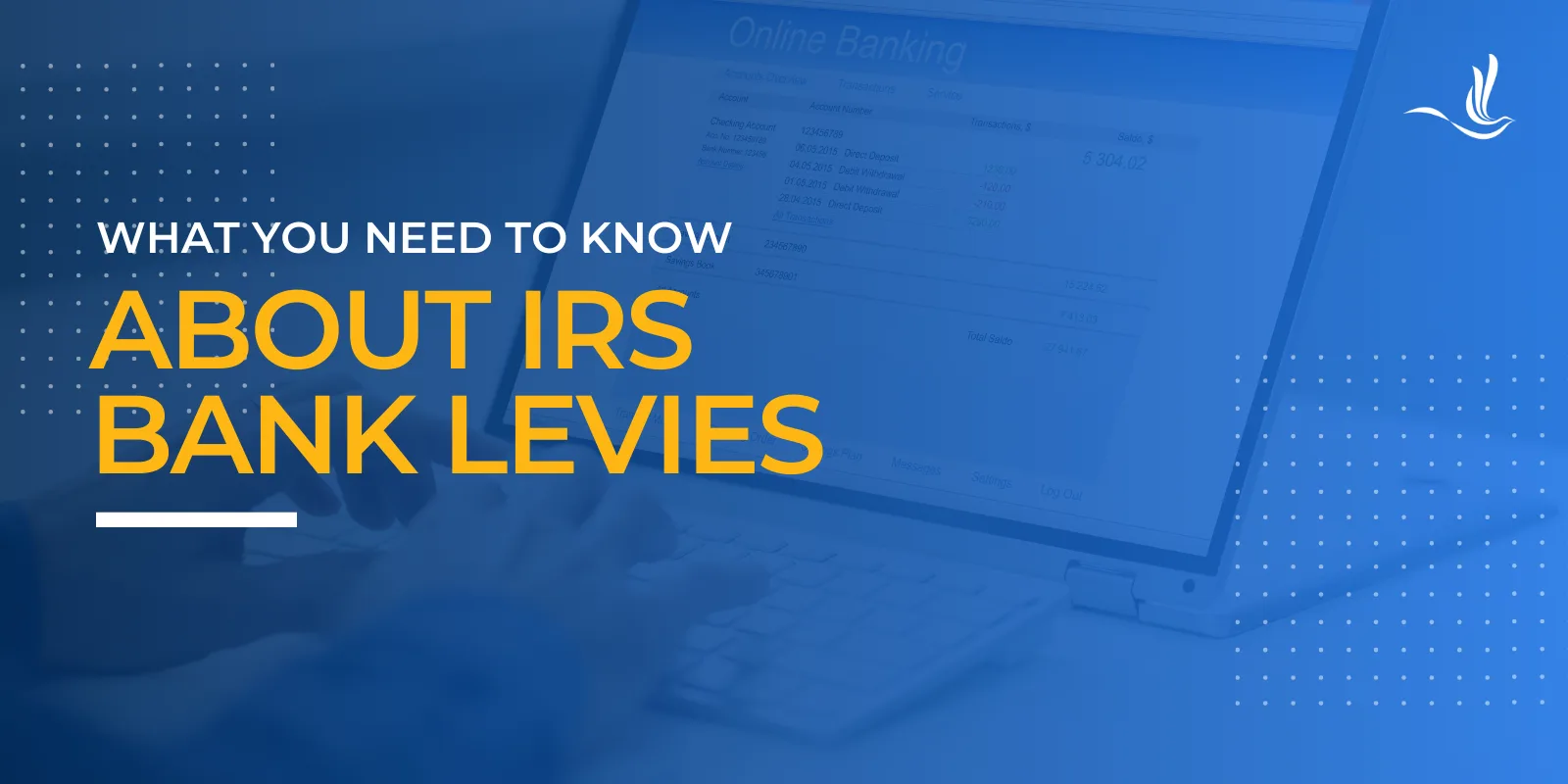Key Takeaways:
An IRS bank levy allows the agency to seize funds in your account up to the amount owed, but only freezes the funds available at the time of the levy and not the account itself.
The IRS typically issues a levy after multiple notices, including the Final Notice of Intent to Levy, and provides a 30-day window to request a hearing or take action.
Exempt funds include unemployment benefits, certain pensions and annuities, workers’ compensation, public assistance, and money legally owned by someone else.
Once a levy is issued, your bank holds the funds for 21 days, giving you time to request a release, demonstrate financial hardship, or set up a payment plan.
The IRS can release a levy for financial hardship, errors, installment agreement terms, over-collection, or when releasing the levy will help pay taxes in full.
To avoid levies, file taxes on time, communicate promptly with the IRS, stay current on agreements, and act immediately after receiving final notices.
When dealing with unpaid taxes, one of the most significant and immediate consequences can be an IRS bank levy. This powerful enforcement action allows the IRS to legally seize funds directly from your bank account to satisfy outstanding tax debts. Understanding how an IRS bank levy works, the accounts it can affect, your rights, and the steps to take if you’re facing one is crucial for anyone navigating financial trouble with the IRS. Bank levies can be intimidating, but knowledge is your best defense. By understanding the process, knowing your exemptions, and taking timely action, you can potentially avoid or minimize the impact of a levy.
How Does an IRS Bank Levy Work?
An IRS bank levy is a legal mechanism the IRS uses to collect unpaid taxes. Unlike a wage garnishment, which deducts money from your paycheck over time, a bank levy can seize the full balance in your account up to the amount of tax owed. It’s important to understand a key distinction: a bank levy does not freeze your bank account itself. Instead, it freezes the funds in the account at the time the levy is issued. You can continue using your account for deposits and withdrawals, but you will not be able to access the frozen funds until the levy is resolved.
For example, if you owe $20,000 and have $21,000 in your account, the IRS can freeze $20,000 to satisfy your debt. The remaining $1,000 is still available for your use. Future deposits made after the freeze are not affected unless the IRS issues a new levy. In rare cases, the IRS can levy without providing a 30-day notice. This usually happens if the IRS believes collection is at risk, if there is a disqualified employment tax levy, or if the IRS is seizing a tax refund. For nearly all other assets, including wages and bank accounts, a 30-day notice is required.
IRS Bank Levy Timeline and Process
The IRS does not place levies immediately after a tax becomes overdue. Typically, a levy occurs only after months of unpaid taxes, following a series of notices. The standard process includes the following steps:
Tax Assessment and IRS Notice: The IRS must first assess your tax liability and send a notice demanding payment.
Ignoring the Debt: If the taxpayer ignores the notices or declines to pay, the IRS issues a “Final Notice of Intent to Levy With Your Right to a Hearing.” This notice gives you 30 days to act.
Bank Levy Issued: If you do not request a hearing or resolve your tax debt, the IRS sends a levy notice to your bank. The bank freezes funds up to the amount owed. Most banks comply immediately, as failure to do so could hold them personally liable for the taxes.
21-Day Hold Period: After receiving the levy, the bank holds the frozen funds for 21 days. This gives you time to take action. During this period, you can request a levy release, set up a payment plan, or demonstrate financial hardship.
Fund Transfer to IRS: If no resolution occurs within 21 days, the bank remits the funds to the IRS on the 22nd day.
What Types of Accounts Can Be Levied?
The IRS can levy funds from several types of financial accounts, including:
Checking accounts
Savings accounts
Money market accounts
Investment accounts (with special rules)
It’s critical to note that the levy only affects funds available at the time the levy is processed. Future deposits are safe unless a new levy is issued.
Funds Exempt From a Bank Levy
While the IRS can seize many assets to recover unpaid taxes, some funds are legally protected. Exempt funds include:
Unemployment benefits
Certain annuity and pension payments
Workers’ compensation
Certain service-connected disability payments
Certain public assistance payments
Assistance under the Job Training Partnership Act
Judgments for support of minor children
The IRS also cannot take funds that legally belong to someone else. For instance, if you are listed as a joint accountholder on an account owned by a disabled adult child, the IRS cannot seize those funds.
Fees for Bank Levies
By law, your bank can charge a fee for processing a levy, typically around $100. If the levy is removed because it was issued in error, you may request a refund from the IRS using Form 8546. You can also seek reimbursement for overdraft or insufficient funds fees caused by the levy. Legitimate levy fees, however, are generally non-refundable.
Steps to Take If You’re Facing a Bank Levy
If you receive a Final Notice of Intent to Levy, acting quickly can make all the difference. Here’s what to do:
Request a Levy Release: The IRS can release the levy for immediate financial hardship, errors, or installment agreements that mandate release. Financial hardship typically means you cannot meet basic living expenses, and you’ll need documentation such as eviction notices or utility shut-off warnings.
Request a Collection Due Process Hearing: You have 30 days to request this hearing. It temporarily halts the levy while the IRS reviews your case.
Resolve the Debt: Pay in full if possible. If not, consider an installment agreement or an Offer in Compromise.
If a bank levy causes hardship, the IRS is required to release it. Reasons for levy release include:
Full payment made before the levy
Collection period expired before the levy
IRS seized more than you owe
Releasing the levy will help you pay the taxes in full
Installment agreement terms dictate the levy be released
Even if a levy is released, you are still responsible for resolving your remaining tax debt.
Does the IRS Need to Leave Money for Necessities?
No, the IRS is not legally required to leave funds in your account for essentials. However, if the levy prevents you from covering basic living expenses, you can petition for release based on financial hardship. The IRS uses financial standards to determine what you need, including national standards for groceries, clothing, and medical expenses, and local standards for housing and utilities.
How to Avoid a Bank Levy in the Future
To avoid facing an IRS bank levy, it’s important to stay on top of your tax obligations and address issues promptly. Here are some tips:
File on Time: Even if you can’t pay your taxes, file your return on time. The IRS is more likely to work with you if you file, even if you owe.
Communicate with the IRS: If you receive notices about unpaid taxes, respond promptly. You may be able to set up a payment plan or find other solutions before enforcement actions like a bank levy are taken.
Stay Current: If you’re already on an installment plan or settlement agreement, make sure you stay current with your payments. Falling behind on these arrangements can trigger a levy.
Act Quickly After Final Notices: Request hearings, make arrangements, or provide proof of financial hardship.
Frequently Asked Question
How long does it take for the IRS to levy bank accounts?The IRS typically issues a bank levy only after months of unpaid taxes, often six months or more. Before levying, they send multiple notices, including the Final Notice of Intent to Levy, giving you time to act.
How do I protect my bank account from a levy?To protect your account, respond promptly to IRS notices, set up an installment agreement or Offer in Compromise, and act immediately after receiving a Final Notice of Intent to Levy. Communication with the IRS is key to avoiding a bank levy.
What bank accounts can the IRS not touch?Exempt funds include unemployment benefits, certain pensions and annuities, workers’ compensation, service-connected disability payments, public assistance, and funds legally owned by another person, such as a disabled child or elderly parent.
Can I deposit money after a bank levy?Yes. A bank levy only freezes the funds available in your account at the time the levy is issued. Future deposits are safe unless the IRS issues a new levy.
How many notices before the IRS levy?The IRS generally sends multiple notices for unpaid taxes before a levy, culminating in the Final Notice of Intent to Levy, which includes a 30-day right to request a hearing.
Tax Help for Those Being Levied by the IRS
An IRS bank levy can be a serious financial disruption, but it’s not inevitable if you act early. Understanding the process and knowing your options can help you prevent or address a levy before it causes long-term damage. If you’re facing a levy, consider seeking professional assistance to navigate the process and explore potential relief options. Optima Tax Relief is the nation’s leading tax resolution firm with over a decade of experience helping taxpayers with tough tax situations.
If You Need Tax Help, Contact Us Today for a Free Consultation


























